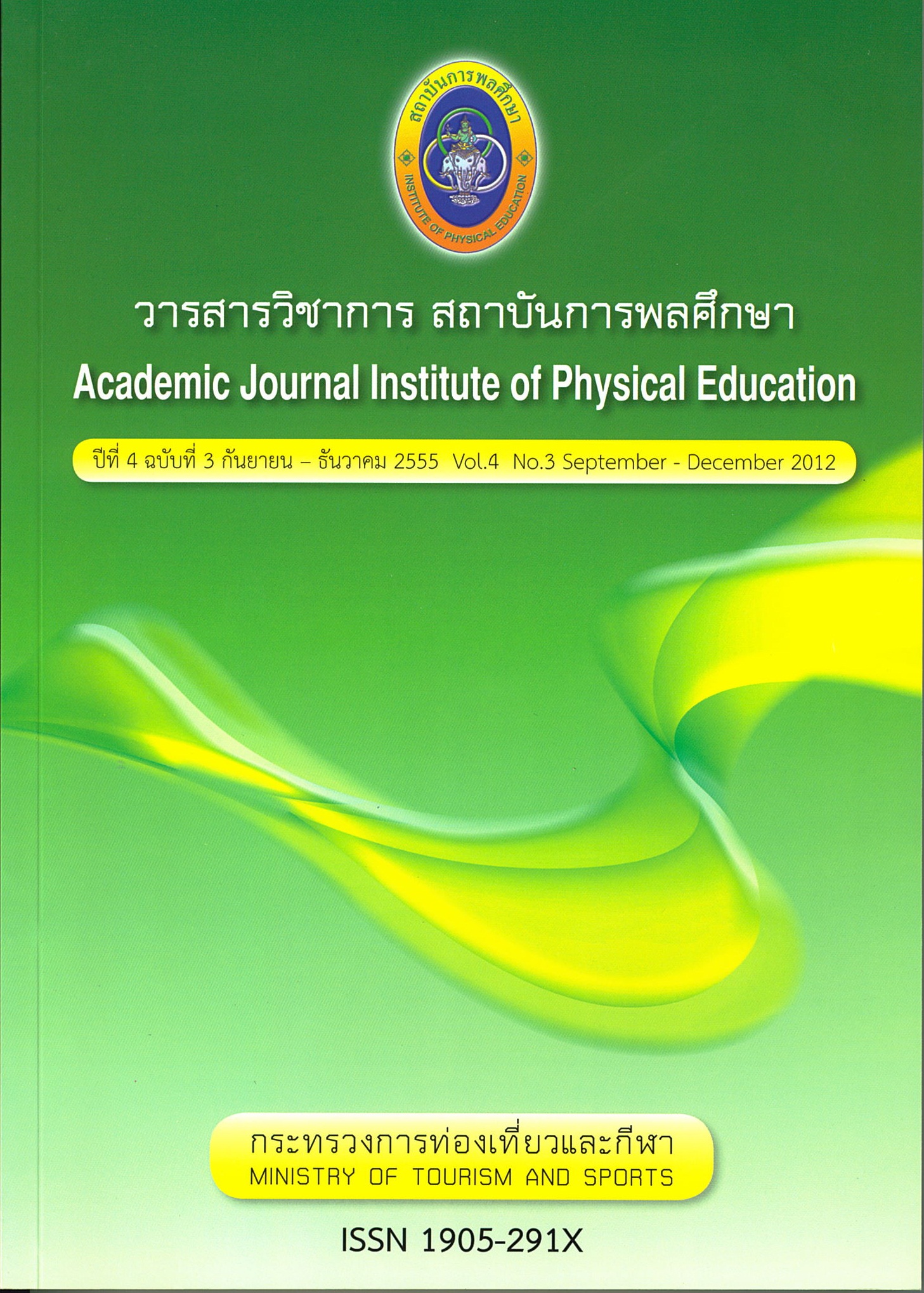An Effective Administration Model for Institute of Physical Education
Main Article Content
Abstract
The purpose of the study was to construct effective administrative model for Institute of Physical Education with 3 specific objectives, including 1) to determine current practice, problem and administrative needs of the Institute, 2) to construct the effective administration model for the Institute and 3) to evaluate the suitability, possibility and benefit of the constructed model. Three research phases were used as the research procedure, including : Phase 1 to develop questionnaire for determining current practice, problem and administrative needs with 232 subjects composing of the administrators and the Instructors in all 17 campuses; Phase 2 to develop the administrative model which was evaluated the objective congruence and the drafted model by the experts; and Phase 3 to evaluate the developed model by focus group discussion among the concerned experts. The results of the study were as follow.
- The Education Physical Institute operated on general work, academic, research, budget and human resource “moderately and had “much” problems on research, structure, human resource, leadership, academic and decentralization and empowerment. However, there were “moderate” problem on budget, information technology and communication and policy making distribution. Moreover, they needed for academic promotion, human resource development, a person development leadership training.
- The constructed model had high objective congruence and very much suitability and benefit of the model, but much on possibility.
According to the above – mentioned results the administrative model for Institute of Physical Education which was suitable, possible and beneficial was as follows.
(1) Administering by concentrating on the principles of decentralization from the Central Official to the Campus, participation of all concern personnel and coordination between the central office and campus which had specific context.
(2) Aiming at attainability of the Institute mission and TQF.
(3) Organizing administrative mechanism which was appropriate to the Central and the Campus levels and there were the office of strategy development for the Central office and the centers for development in individual campus.
(4) Carrying on administration of both the Central Office and the Campus by concentrating on the committee. The Central office designated the goals and strategies and decentralized all missions of higher education for attending TQF and each campus curried on monitoring, supervising evaluating systematically.
(5) Using multiple ways for evaluating by the qualified personnel consisting with reality and distributed good practices for knowing and improving.
(6) The realization, the vision ,the accountability and strategy including aiming at the institute success of the administrators of both the Central Office and the Campus were the key success of the Institute.
Article Details
The published article is a copyright of the Academic Journal of Thailand National Sports University. The passage appeared in each article in this academic journal is a perspective of each author which is not related to the journal. Each author is required to be responsible for all components of his/her own article. If there are any mistakes, each author must be responsible for those mistakes on his/her own.
References
Slaughter, Sheila,& Leslie, Larry L. (1997). Academic Capitalism: Politics Policies, and the ntrepreneurial University. Baltimore, MD : Johns Hopkins University Press.
สํานักงานรับรองมาตรฐานแลประเมินคุณภาพการศึกษา. (2550), รายงานการประเมินคุณภาพภายนอกสถาบันอุดมศึกษา. สถาบันการพลศึกษา.
ศิริชัย กาญจนวาสี (2552). ทฤษฎีการทดสอบแบบดั้งเดิม. พิมพ์ครั้งที่ 6. กรุงเทพมหานคร: โรงพิมพ์แห่งจุฬาลงกรณ์มหาวิทยาลัย.
สถาบันการพลศึกษา. (2548). คู่มือการจัดการศึกษา ตามหลักสูตรสถาบันการพลศึกษา พ.ศ. 2548. กรุงเทพฯ : องค์การรับส่งสินค้าและพัสดุภัณฑ์.
จรัส สุวรรณเวลา. (2545). อุดมศึกษาไทย. กรุงเทพฯ : สํานักพิมพ์แห่งจุฬาลงกรณ์มหาวิทยาลัย.
สมศักดิ์ พิเศษสุทธิกุล. (2550). รูปแบบการบริหารสถานศึกษาขั้นพื้นฐานขนาดเล็ก, ปริญญานิพนธ์การศึกษามหาบัณฑิต สาขาการบริหารการศึกษา, บัณฑิตวิทยาลัย, มหาวิทยาลัยบูรพา.
ปรัชญา เวสารัชช์. (2543). ตัวชี้วัด “การบริหารจัดการที่ดีในมหาวิทยาลัย” การศึกษานอกโรงเรียน 3.(8) : 35-37.
ธีระ รุญเจริญ. (2547). รายงานการวิจัย เรื่อง สภาพปัจจุบันและปัญหาการมีส่วนร่วมในการบริหารและจัดการศึกษาของคณะกรรมการสถานศึกษาขั้นพื้นฐาน. กรุงเทพฯ : สํานักนโยบายและ แผนการศึกษา สํานักงานสภาการศึกษา

